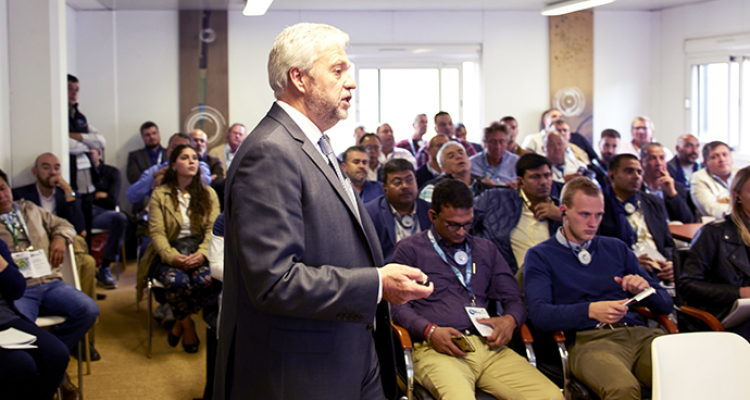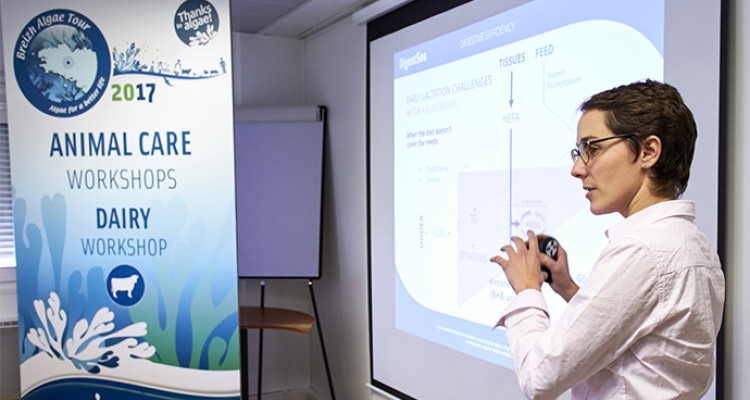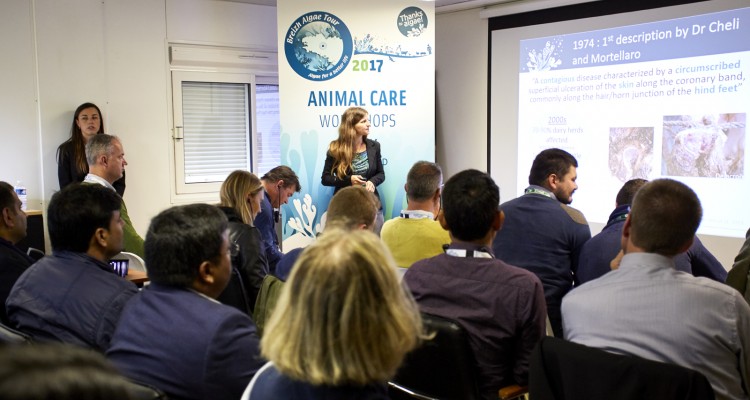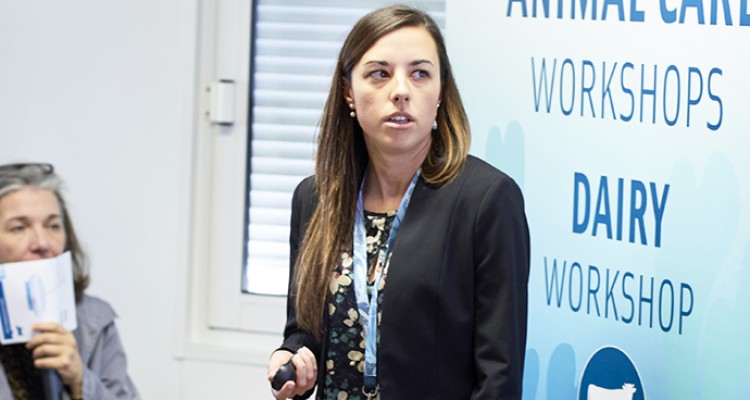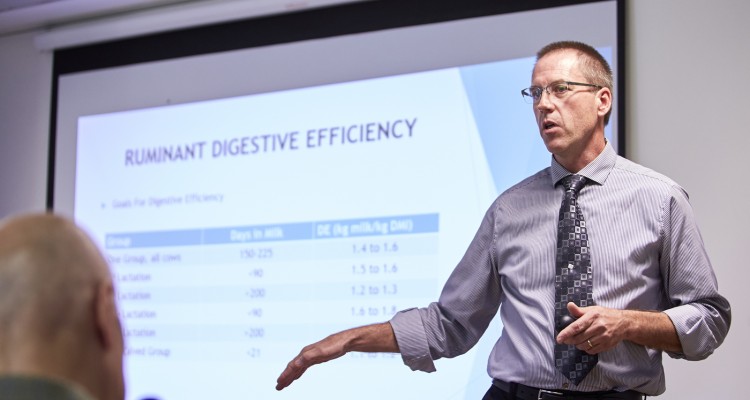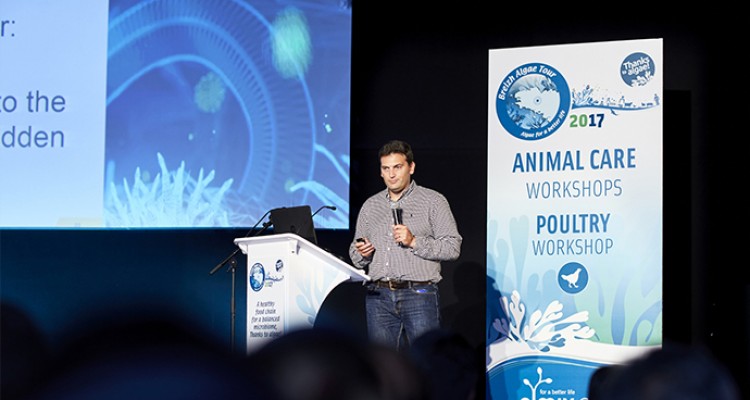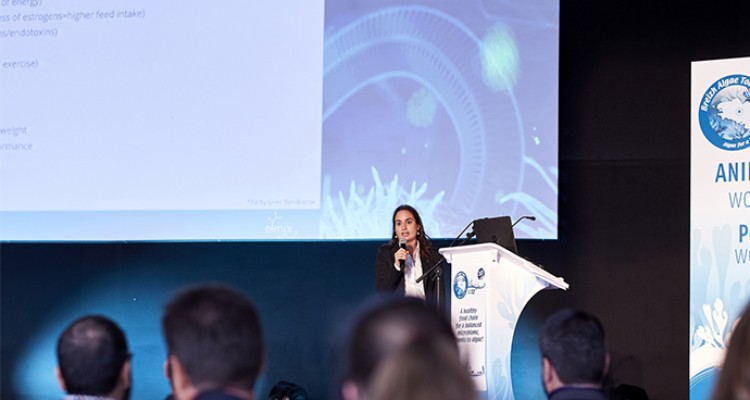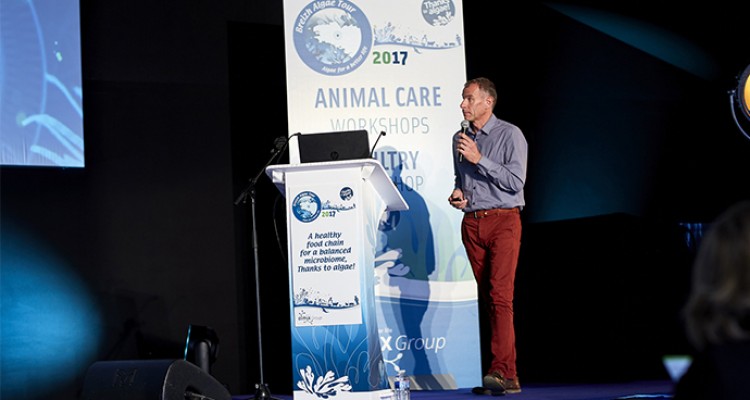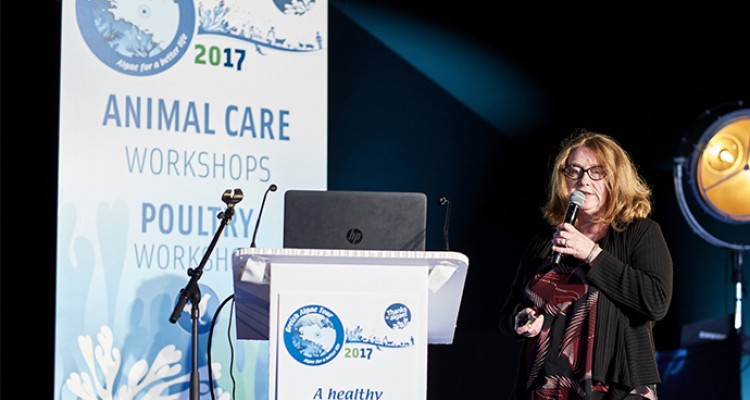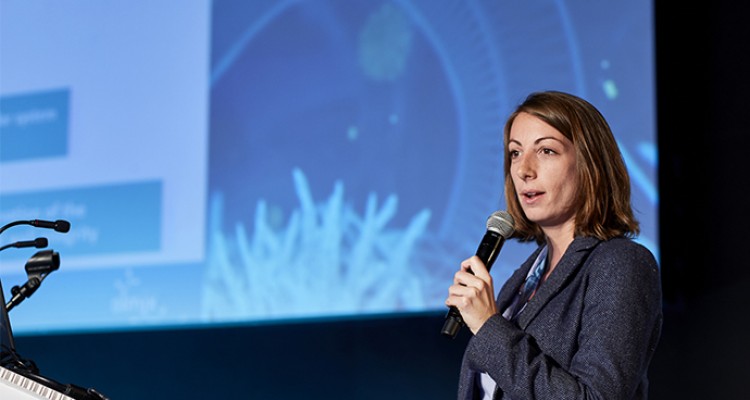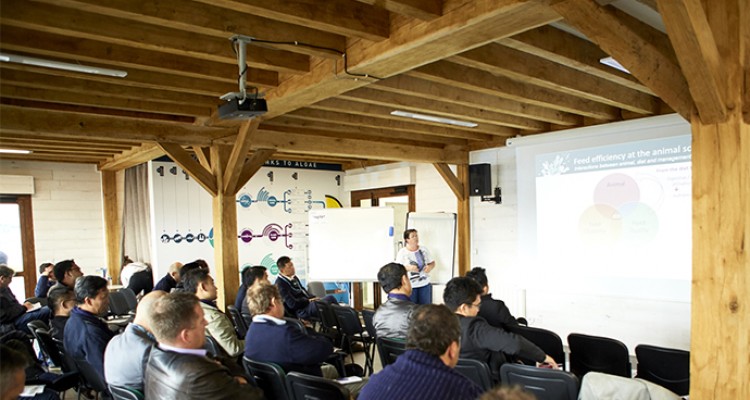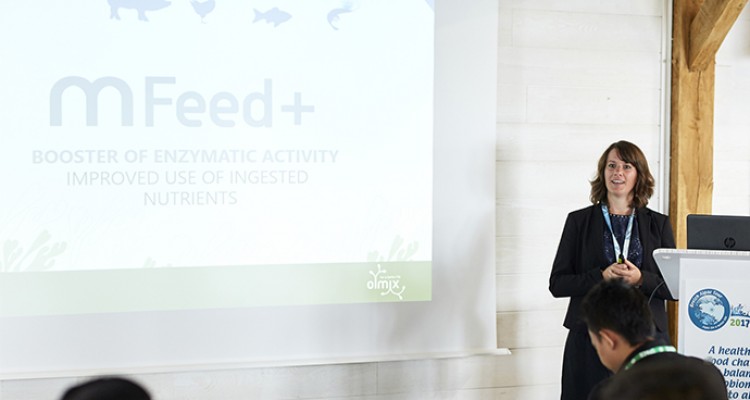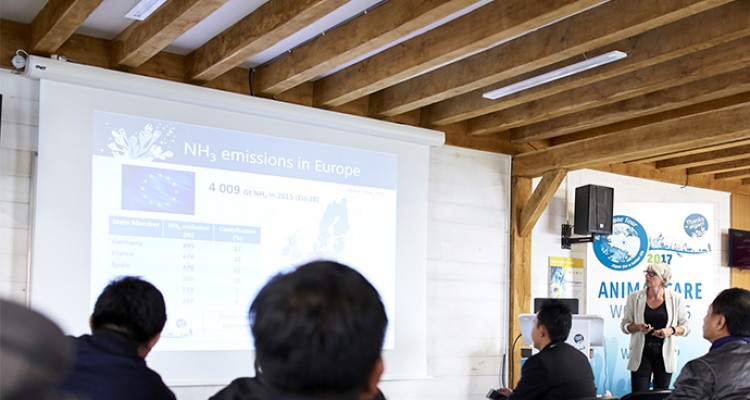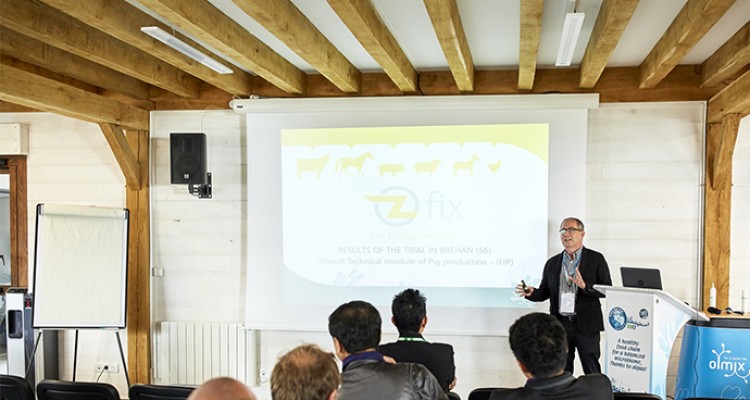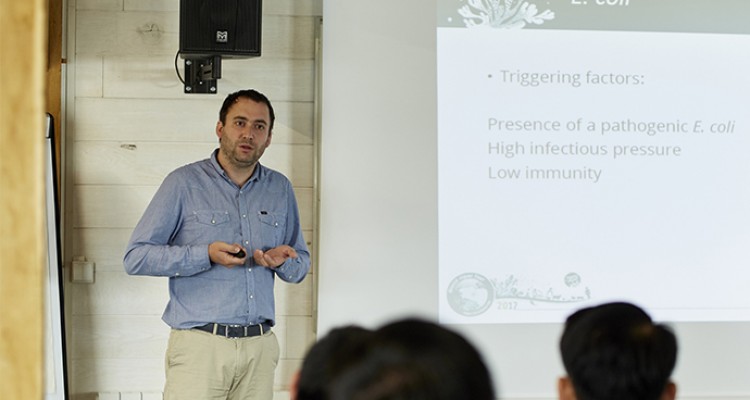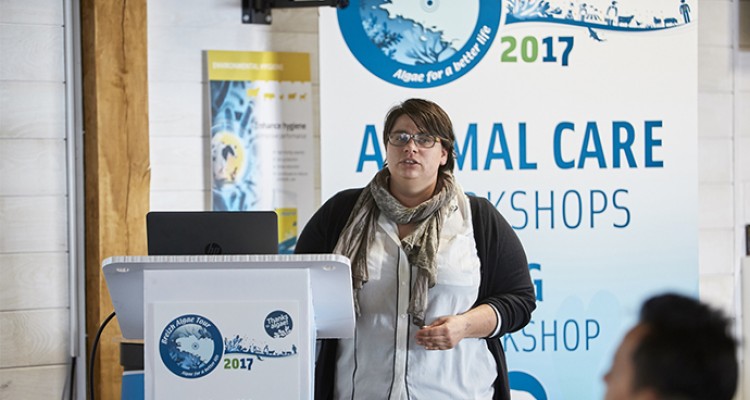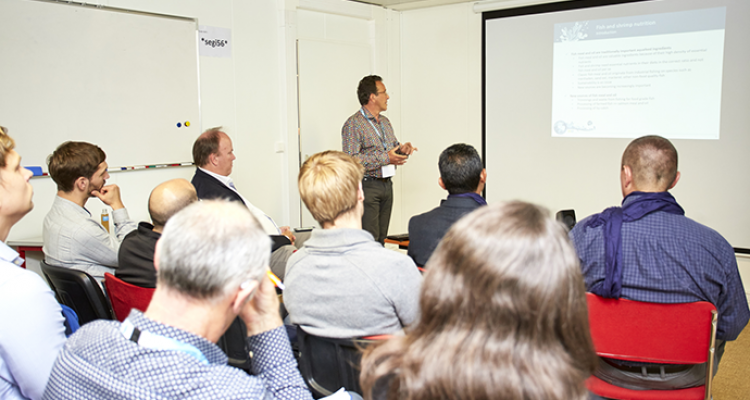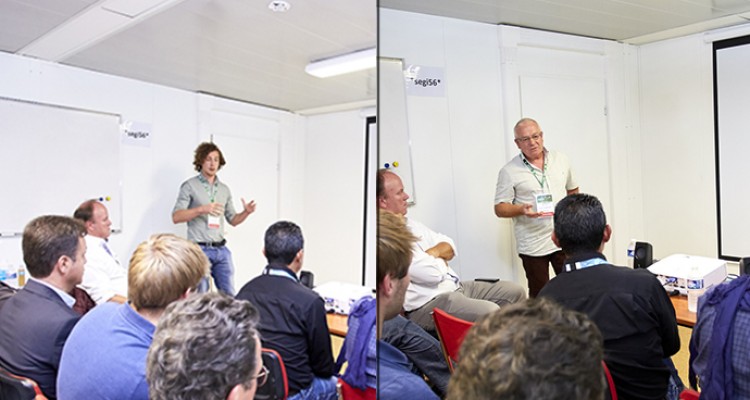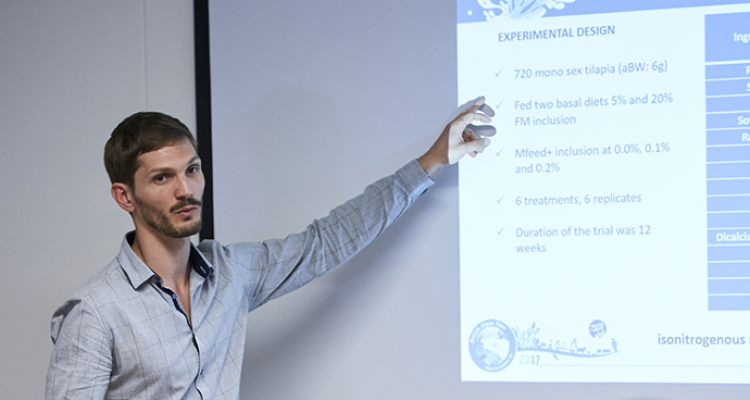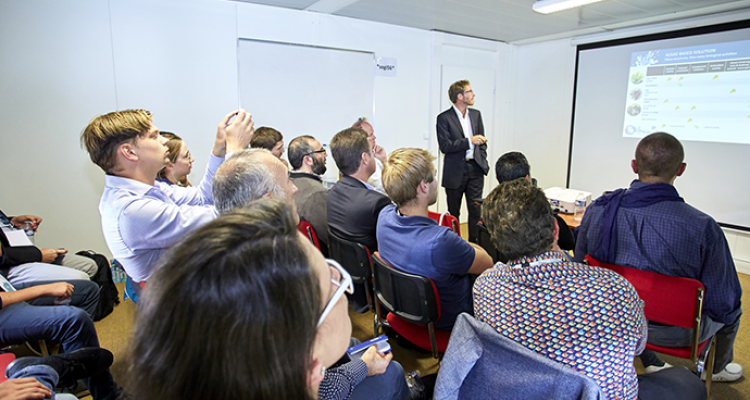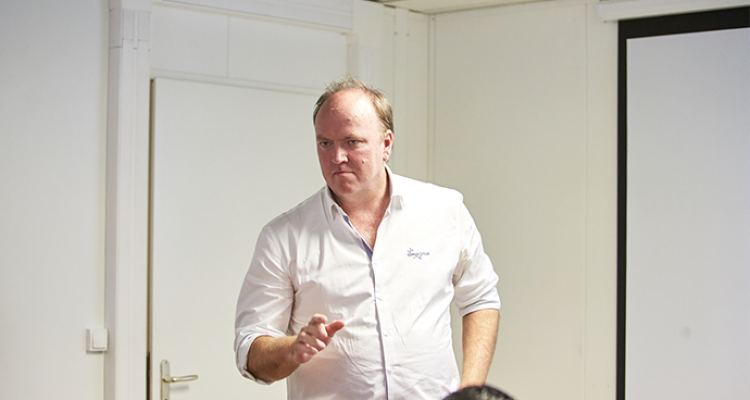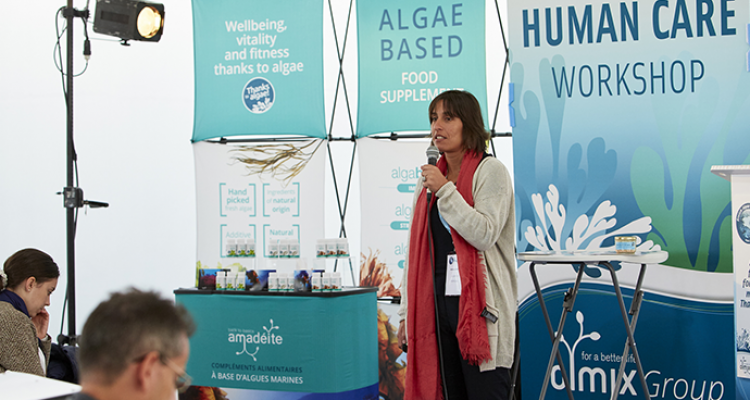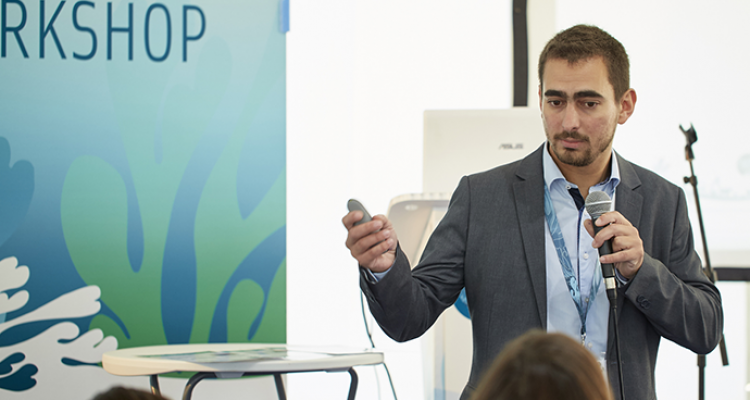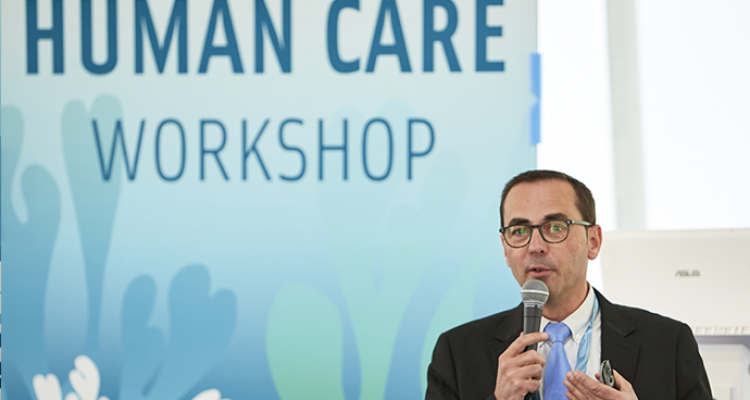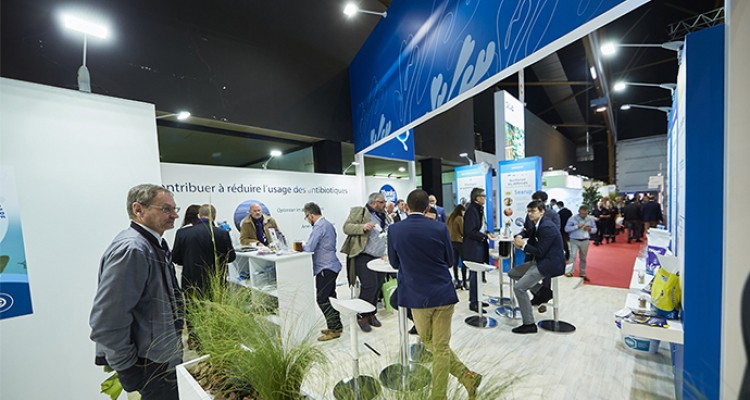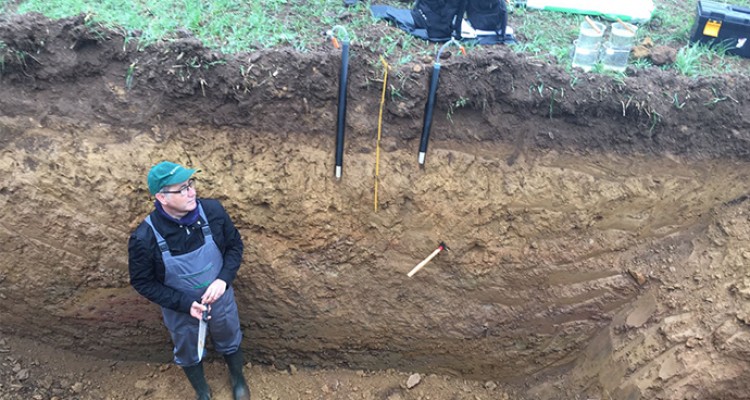If the first day of the Breizh Algae Tour was focused on the innovative ‘HealthSea foodTech’ concept, in which Algae are used in different ways to influence the microbiota and, in consequence, improve plant, animal and human performances and health, on the second day guests had the chance to choose between several scientific workshops on the 3 strategic fields of Olmix Group’s activities: Plant Care, Animal Care and Human Care.
Plant Care workshops
The technical workshops on Plant Care presented the latest research results on the use of algae to improve vegetables and crops health and productivity, and also showed the synergies between the Olmix and PRP portfolios, which strengthens the Olmix Group’s global strategy for an Integrated Plant Health Management along with a considerable reduction in chemical fertilizers and pesticide use.
First, as an introduction, Mr Henri Beekers (R&D Manager Olmix Plant Care, the Netherlands), reminded the global challenge for the agro-food industry in order to feed the world with quality food and low environmental footprint, and then gave the floor to Mr Ton Terlow, (Business Development Olmix Plant Care, the Netherlands), who delivered a lecture on the mode of action of the patented Marathon Organic Buffer Complex:
“The 3 modes of action of Marathon are ammonium feeding, long lasting nutrient supply and bacterial activity stimulation. What are the differences between Marathon and other organic-based fertilizers?: the intimate workout of soil organic matter dynamics, complexion techniques and a targeted selection of organic matter, among others”, he explained.
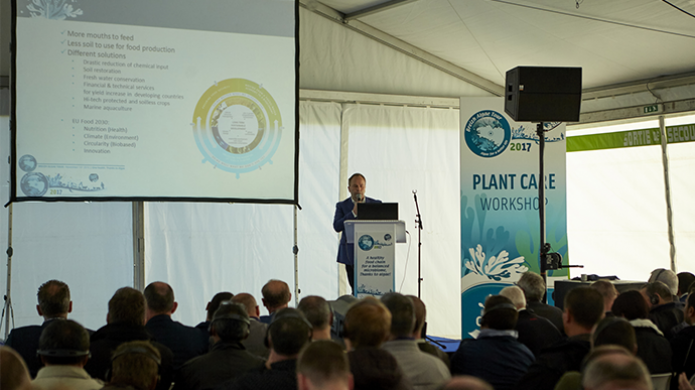
Mr Henri Beekers (R&D Manager Olmix Plant Care, the Netherlands).
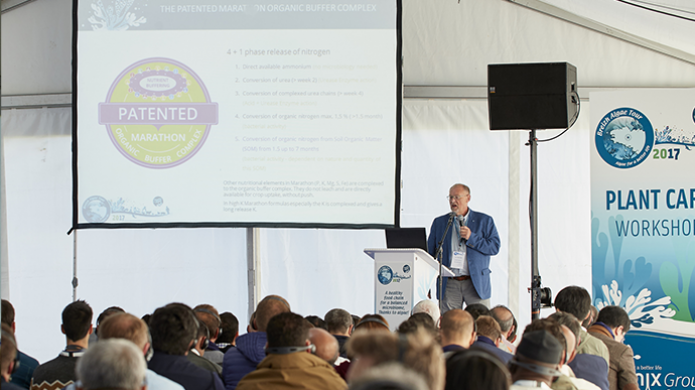
Mr Ton Terlouw (Business Development Olmix Plant Care, the Netherlands).
Later, Mr Bruno Daridon, (Technology Manager from PRP Technologies, France), shared some information on the Mineral Inducer Process (MIP) -technology based on the ignition of soil microbial activity- by explaining that “the Mineral Inducer Process is designed for agroecology toolbox. Acting as a priming effect on the soil food network, it can be mixed with many other technologies”. Right after, Mr Florian Tilly (Olmix Plant Care Product Manager, France), talked about the benefits of the Olmix’s specific seaweed extracts:
“What distinguishes Olmix’s seaweed extract from competitors? Performing solutions through the use of renewable raw material from various natural sources and a 100% controlled production chain and unique processing and biorefinery technologies”, he said.
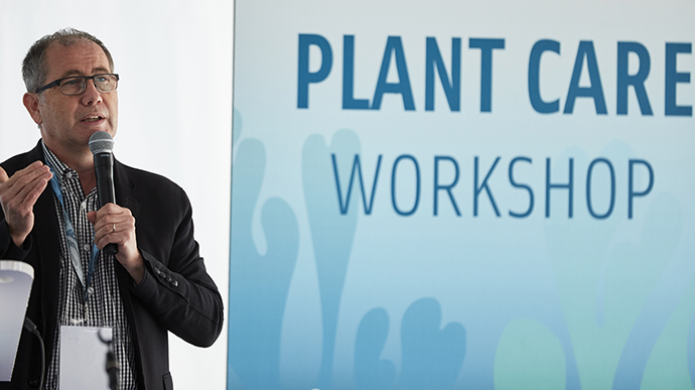
Mr Bruno Daridon (Technology Manager from PRP Technologies, France).
In the afternoon, Mr Didier Blin (PRP Technologies Marketing Director, France), took the lead to present the synergies in the product portfolios of Olmix and PRP as well as how these natural alternatives can contribute to the plant’s health and environment:
“We are a Group with a strong and long-time expertise in agriculture. Olmix is an expert in mineral sourcing, seaweeds refining and bioactive compounds. Olmix Plant Care focuses mainly on plant nutrition by organic and mineral fertilizers and progressive release technology. PRP Technologies has a strong experience in plant biostimulation and soils biological activation. In short, the new consolidated Olmix Plant Care division offers a full range for technical and economical performances. We have the skills and the tools to offer adapted solutions to various situations all over the world”.
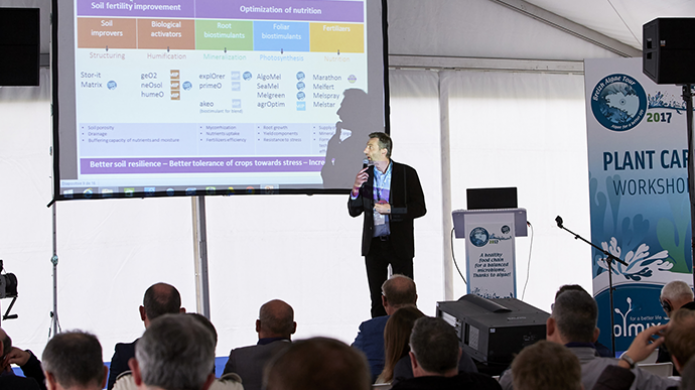
Mr Didier Blin (PRP Technologies Marketing Director, France).
Finally, several members of the Olmix Plant Care Team went up on stage to show some on-field results through an interactive discussion with the audience and, again, Mr Henri Beekers gathered the highlights of the day in the final ‘Roundup of the day’.
Animal Care workshops
The Animal Care workshops started with 1 plenary session with 3 presentations.
The first one gave a scientific overview about the different opportunities that algae bring to animal production. Dr Marinus van Krimpen (Wageningen University, the Netherlands) shed some light on the promising results on the extraction of protein from seaweed and highlighted that algae are more and more seen as an important source of bioactive components. This presentation conforts the Olmix objectives of going further in the specific biorefinery of algae to valorise highly potential active fractions!After that, it was Dr Isabelle Oswald’s (Toxalim Unit at INRA, France) turn to deliver her speech on ‘Fusariotoxins and intestinal health’. The renowned specialist came up with some interesting points on how mycotoxins can damage gut health even when the contamination rates are low:
“The gastro-intestinal tract is the first barrier against food contaminants. The intestinal epithelium can be exposed to high concentrations of mycotoxins upon ingestion of contaminated food. For example, DON decreases the intestinal barrier function and induces intestinal inflammation. On the other hand, fungi produces several mycotoxins simultaneously and, therefore, feed may be contaminated by several fungi. The message is clear: co-contamination by several mycotoxins is the rule, not the exception”, she explained. She also shed light on the fact that the research unit ‘Toxalim’ recently discovered that detrimental synergies between mycotoxins are even more powerful at low dosage!
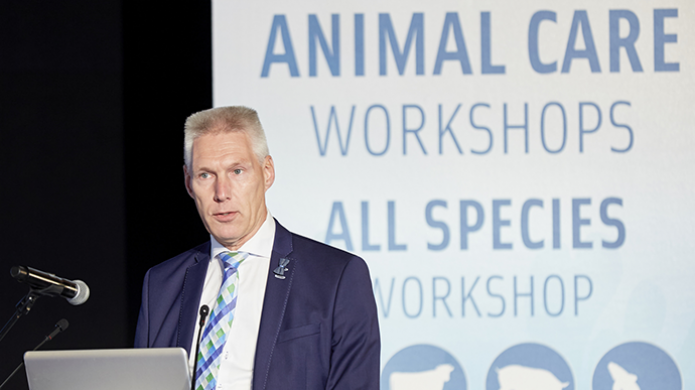
Dr Marinus van Krimpen (Wageningen University, the Netherlands).
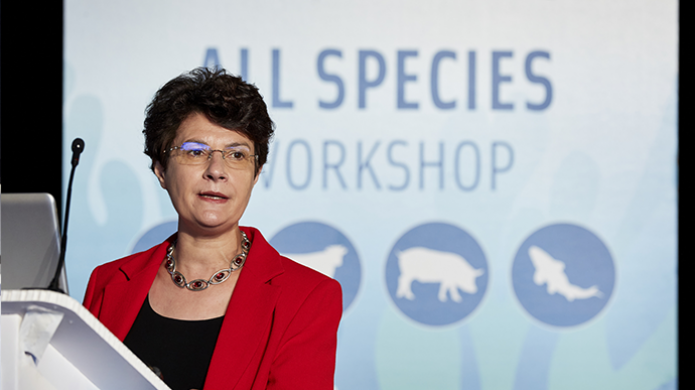
Dr. Isabelle Oswald (Toxalim Unit at INRA, France).
María Ángeles Rodríguez, Olmix Animal Care Technical Service Manager, concluded the mycotoxin speech by explaining the different tools Olmix has developped to cope with mycotoxins, from suspiscion to solution.
Intestinal health was one of the main topics the first day of Breizh Algae Tour and a key research subject for Olmix so it was not strange that Mr Ignacio Caballero (UMR ISP 1282, INRA Nouzilly, France), gave a conference about the role of intestinal immunity in the animals performance. It was also the occasion to present results obtained in a research partnership with Olmix, demonstrating that algae extracts can stimulate in vitro the production of immunity mediators on pig epitelial cell.
The speech was completed by Pi Nyvall Collen, Olmix R&D Manager, who highlighted that similar results have been demonstrated on poultry immune cells too in a partnership research together with Brest University (France).
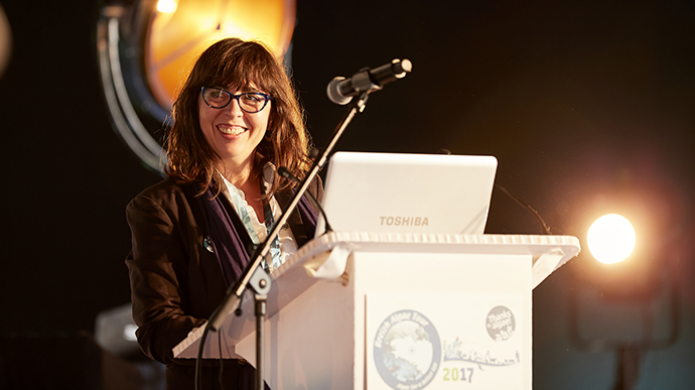
Ms María Ángeles Rodríguez (OImix Animal Care Technical Service Manager, Spain).
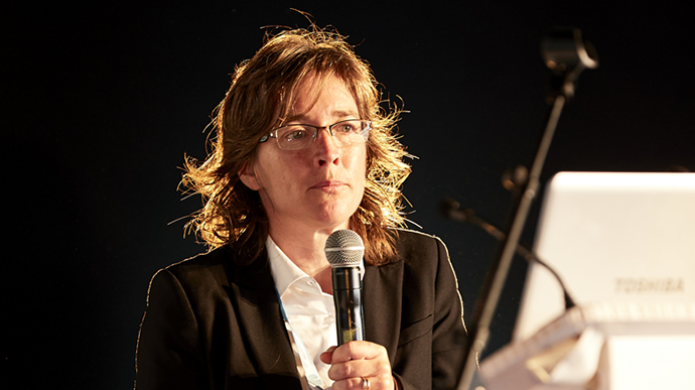
Ms Pi Nyvall Collen (Olmix R&D Manager, France).
Later on, in the afternoon, the Animal Care workshops were divided by specie and attendees could choose between ‘Dairy’, ‘Poultry’, ‘Swine’ and ‘Aqua’.
Human Care workshops
The Olmix Human Care Team showed different strategies in which seaweed play a role, directly or not, towards human health and nutrition: as feed ingredient to improve the quality of the meat, as technological ingredient to improve the quality of food products by replacing additives or allergenic substances, as health ingredient to improve the nutritional profile of food products, and as food supplement to support directly human health thanks to their specifics compounds. To show these strategies and more, the Olmix Human Care Team offered several conferences on the matter:
First, Ms Jeanne-Marie Robert (Breizh Algae, France) explained how to improve meat quality thanks to algae and presented the results of a recent study that shows the great interest of consumers in the origin of products besides aspects such as sanity and environment. It was only then when Mr Marvin Rehel (Olmix Human Care, France) shared with the attendees one of the hottest trend within the industry: the high demand of a clean and natural label of products:
“It is very clear that something is changing within the industry. More and more, consumers are demanding natural solutions and alternatives. A brand new ‘clean label’ is on its way”, he said.
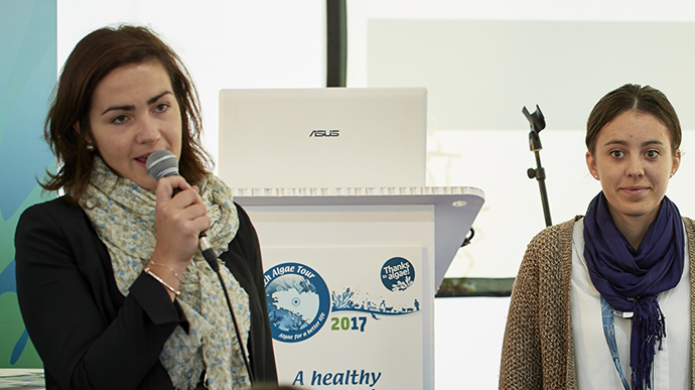
Ms Jean Marie Robert (Breizh Algae, France).
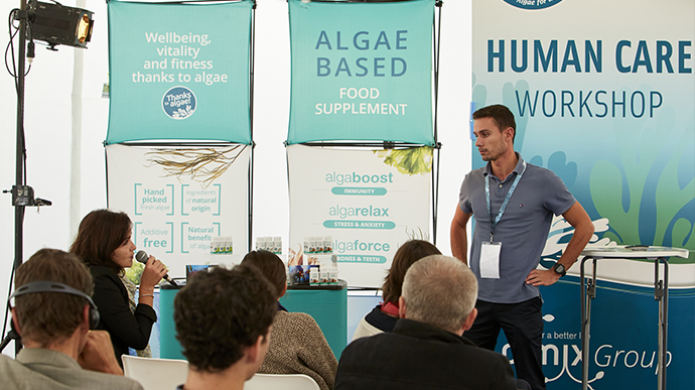
Mr Marvin Rehel (Olmix Human Care, France)
The next two speeches of the morning were delivered first by Ms Héléna Abreu (co-founder and R&D director of ALGAplus, Portugal) and, secondly, by Mr Tony Da Cruz (Olmix Human Care, France). Ms Abreu shared some interesting information about seaweed for human health and nutrition:
In the afternoon, the Human Care participants had the chance to visit the Landrellec Peninsula in the North of Brittany, where they discovered algae in their natural environment! There, Régine Quéva (Algues & Co, France) showed in-situ the wide biodiversity of seaweeds in Brittany:
“More than 800 species of seaweeds are represented here, each with their own appearance, taste and health benefits. Brittany is an exceptional place for seaweeds to grow thanks to specific and unique conditions, bringing exceptional seaweeds for humans, animals and plants”.
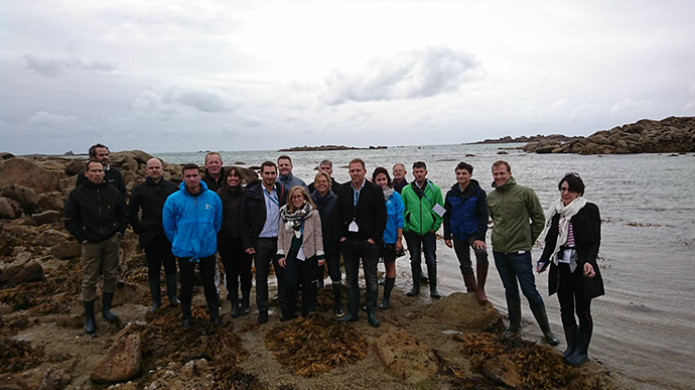
Landrellec Peninsula (Brittany, France).
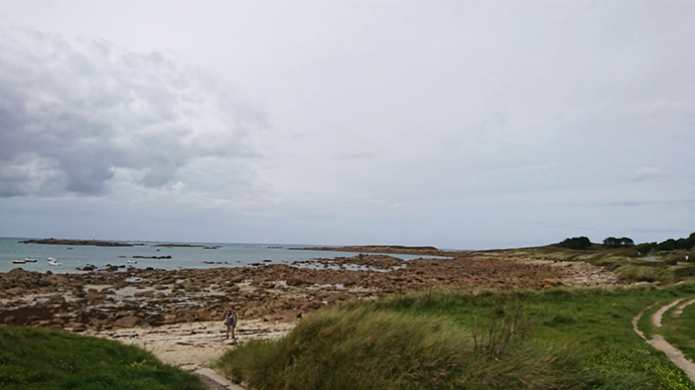
Landrellec Peninsula (Brittany, France).









